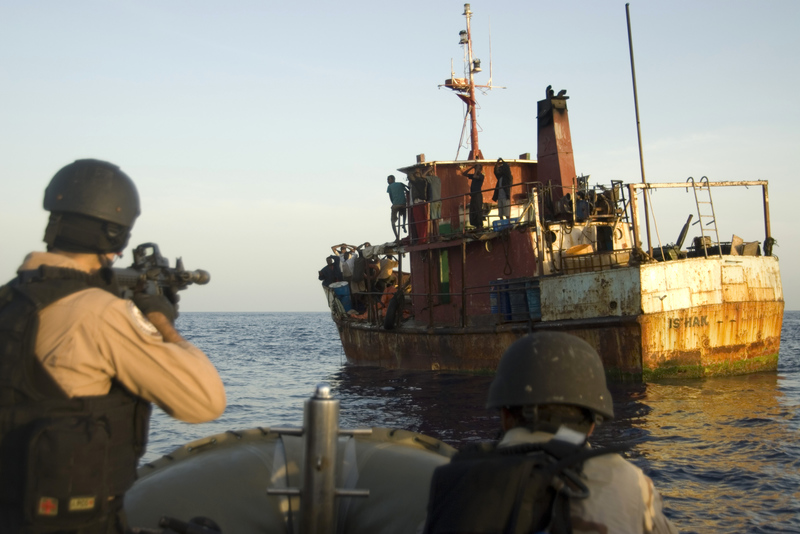Crimes at sea cripple sustainable development
03 March 2020 | Story Nadia Krige. Photo Eric L. Beauregard, Wikimedia. Read time 10 min.
A surge in piracy off the coast of Somalia during the mid-2000s threatened global trade and other state interests to such an extent that an unprecedented global counter-response was mobilised. Navies formed coalitions while public–private partnerships combatted the more far-reaching effects. Carina Bruwer, a PhD candidate with the Centre of Criminology at the University of Cape Town (UCT), is investigating why other maritime crimes have not resulted in a similar response and how this threatens the achievement of the 2030 United Nations (UN) Sustainable Development Goals (SDGs).
“I find it fascinating that 70% of the world’s surface is water and, for the most part, we have no idea what happens there,” Bruwer explains. “It really is a case of what happens at sea stays at sea.”
Bruwer’s recent research unpacked the ways in which transnational organised crime at sea threatens a number of the UN SDGs and how, despite this, people do not seem driven to confront it with the same vigour they did piracy.
“It really is a case of what happens at sea stays at sea.”
Despite various international legal instruments that try to regulate what happens at sea, the oceans remain something of a legal void.
“Unfortunately, existing international law instruments are often not used to combat crimes at sea,” she says. “But, as we saw with the response to Somali piracy, they can indeed be implemented in a hugely successful manner in this otherwise mostly unregulated space.”
“This research is of topical relevance for our understanding of the complex challenges confronting international responses to transnational organised crime,” says Bruwer’s supervisor and head of the Department of Public Law, Professor Elrena van der Spuy. “The thesis provides rich descriptive detail regarding international coalitions and the kinds of conditions under which [they] become possible.”
Counter-piracy success
It was in the early 2000s that piracy in the Western Indian Ocean first started to pose a threat to international trade passing near the coast of Somalia. Although the attacks are often justified as a response to illegal, unreported and unregulated fishing off the coast of Somalia, they soon started metastasising into something more sinister – due the lack of regulation by the Somali government.
Once trade and relief vessels started suffering under the pirates’ siege and the effects were felt across the globe, private–public partnerships were quick to form and governments joined forces to provide a constant military presence in the embattled waters.
“I was fascinated with the way in which piracy in the Western Indian Ocean increased in such a short space of time and then decreased again just as quickly as result of an unprecedented global governance effort,” Bruwer says.
“In the same way that conditions on land influence crime at sea, maritime crime also influences what happens on land.”
Initially, her PhD posed the question: Why does a crime like piracy receive such a quick and effective response while other maritime crimes seemingly slip under the radar?
“Firstly, and quite obviously, these pirate attacks were impacting major shipping nations,” she explains. “Secondly, being part of an international task force against piracy arguably gave many nations an excuse to establish a naval presence well beyond their own waters.”
Overlooked maritime crimes
As Bruwer’s research continued, she shifted her focus to how the lessons learned from piracy could be used in combatting other maritime crimes.
In her recent article, published in African Security Review, Bruwer uses heroin trafficking and the illegal ivory trade as examples of transnational organised crimes that use the Western Indian Ocean as a connecting node between Africa and Asia.
The journey of heroin typically starts in Afghanistan, moving down to Iran and Pakistan where it is packaged in dhows and sent across the Indian Ocean to eastern African ports and Indian Ocean islands, and then sent on to mostly Europe.
Travelling in the opposite direction, ivory is typically moved from Tanzania, Kenya and Mozambique to the east and its main consumer markets in China.
Development can only happen under secure conditions, while lasting security depends on sustainable development.
Despite having serious consequences on land – causing corruption, jeopardising human well-being in the case of heroin and annihilating vulnerable wildlife species in the case of ivory – these crimes tend to continue with minimal legal intervention because they happen at sea.
Failing development
Referring to SDGs 1 (no poverty), 2 (zero hunger), 3 (good health and well-being), 8 (decent work and economic growth), 14 (life below water) and 16 (life on land), Bruwer’s article highlights the numerous ways in which transnational organised crime at sea – and the lack of effective ways to stop it – has a negative impact on sustainable development on land.
“In the same way that conditions on land influence crime at sea, maritime crime also influences what happens on land,” Bruwer says.
Bruwer points out that security and development are two sides of the same coin: development can only happen under secure conditions, while lasting security depends on sustainable development.
Therefore, it is important that other transnational organised crimes at sea are tackled with the same vigour as piracy has been.
The SDG key
Bruwer argues that SDG 16 (peace, justice and strong institutions) and SDG 17 (sustainable development through global partnerships) should form the basis for any future counter-response to maritime crime.
It is important that other transnational organised crimes at sea are tackled with the same vigour as piracy has been.
She explains that a lack of peace, justice and strong institutions creates a breeding ground for corruption and – by extension – organised crime.
“Ideally, you would have strong institutions that aren’t corruptible,” she says. “I think that’s by far the biggest challenge in combatting organised crime.”
As for the importance of SDG 17, Bruwer says, “Partnerships are absolutely key. As much as the crime is transnational, the response must also be transnational.”
- Bruwer C (2020) Transnational organised crime at sea as a threat to the sustainable development goals: Taking direction from piracy and counter-piracy in the Western Indian Ocean. African Security Review. https://doi.org/10.1080/10246029.2020.1728352
 This work is licensed under a Creative Commons Attribution-NoDerivatives 4.0 International License.
This work is licensed under a Creative Commons Attribution-NoDerivatives 4.0 International License.
Please view the republishing articles page for more information.









